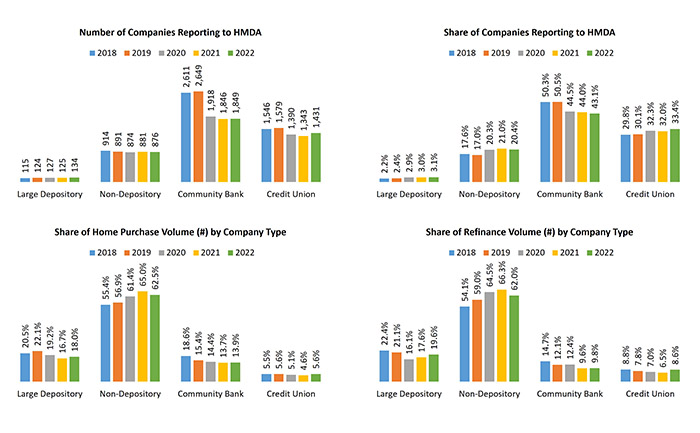
MBA Chart of the Week July 31: Analyzing HMDA Data

(Source: Mortgage Bankers Association)
A total of 4,290 companies reported lending activity under the Home Mortgage Disclosure Act (HMDA) in 2022, according to MBA’s analyses of the dataset. Company types are defined by primary regulator and balance sheet assets, with large depositories holding assets of $10 billion or more.
Large depositories – historically, the smallest group of HMDA reporters – numbered 134 in 2022, their highest count since 2012. This brought up the large depositories’ share of HMDA reporters to 3.1% – their highest share since 2008 (the first year MBA started tracking this data). Though small in number, large depositories hold the second-largest market share, originating 18.0% of all home purchase loans and 19.6% of all refinance transactions in 2022. Additionally, with a gain of 1.3%, the large depositories picked up more purchase market share than any other group in 2022, and their gain of 2.0% refinance share fell short of only the credit unions by just 0.1%.
Community banks – by contrast, the largest group of HMDA reporters – may best be described as “stable” in 2022. In number, they were almost identical to the previous year at 1,849, though their share of HMDA respondents slipped to 43.1% – the lowest on record. Unlike the other depository groups, the community banks did not see significant gains in market share. For both purchases and refinances, this group picked up just 0.2% in share – from 13.7% in 2021 to 13.9% in 2022 for home purchases, and from 9.6% to 9.8% for refinances.
Credit unions grew to 1,431 strong in 2022 and made up 33.4% of HMDA reporters – their highest share on record. Though second-largest in number and growing as a share of lenders, the credit unions remain the smallest originators, holding just 4.8% of the purchase market and 7.4% of the refinance market on average since 2008. Nonetheless, 2022 proved to be a good year for this group. Credit unions picked up 1.0% of all purchases and their market share of 5.6% just edged out 2019 to become their highest on record. Additionally, their 2.1% gain in refinance share exceeded all other groups, and their 8.6% share of this market was second-highest on record.
Non-depositories held steady in number in 2022 at 876 reporters. Representing just one-fifth (20.4%) of HMDA respondents, the non-depositories originated an impressive 62.5% of all purchase loans and 62.0% of all refinance transactions last year. However, this marked the first year in many that non-depositories lost market share. Their purchase market share decreased by 2.5% after 13 years of consecutive growth in share, averaging a gain of 3.0% per annum. Though the non-depositories have lost refinance market share before – in 2011 and 2018, specifically – their 4.3% loss in 2022 was by far their largest, and a stark reversal from average gains of 3.5% over the previous 13 years.
MBA’s HMDA data analyses are limited to the following: 1-4 unit, closed-end (or exempt), 1st lien loans originated through the retail/consumer direct, broker wholesale, or non-delegated correspondent channels. They exclude home improvement loans and loans with “other” or “not applicable” purposes. Though earlier iterations of the HMDA data are published by the CFPB in spring and early summer, MBA waits to publish its own analyses until mid-summer, after scrubbing the dataset of errors and outliers and allowing reporters time to correct and resubmit their data.
Please visit MBA’s HMDA webpage to view our suite of standard HMDA reports and explore custom reporting options. Our HMDA Residential Originations Databook (with 2022 data) is currently on sale at a $100 discount through August 15th and our HMDA Executive Databook is FREE for MBA members.
